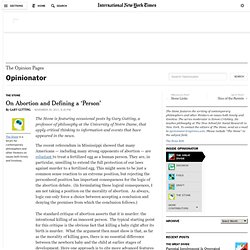

Should we legislate to allow assisted dying? ‘Should we legislate to permit assisted dying?’

A number of legal bids to change UK law over recent years have sought to allow people to assist the death of someone with an incurable disease or terminal illness. At the time of this debate, Lord Falconer was preparing to table a private members bill to legalise assisted dying for the terminally ill in England and Wales. Our YouGov survey polled support for a change in the law on assisted suicide, finding that 70% of UK adults support a change which would make it possible to help someone with an incurable disease die without risk of prosecution for doing so. A remarkable 82% of those who support a change in the law agree that “An individual has the right to choose when and how to die.” Among religious people, 64% support a change in the law on assisted suicide. Growing support for euthanasia is driven by commitment to the individual’s right to choose their own death in preference to drawn-out suffering Quotes Charles Falconer Ilora Finlay.
Stem cell research, abortion and the soul of the embryo. ‘Stem cell research, abortion and the ‘soul of the embryo’?’

In 2011 there were 189,931 abortions among residents of England and Wales. That is 17.5 per 1,000 women, compared with 12 per 1,000 in Scotland. The vast majority, 91% of abortions, are carried out under 13 weeks, and most under 10 weeks. Just 1% are carried out on the grounds of the risk that the child will be born with a disability. When do people think that human life begins (or, as some religious people understand it, that the embryo is ‘ensouled’)? The survey also found that the majority of religious people, like the majority of non-religious people, are in favour of retaining or even raising the current 24-week limit on legal abortion (43% of religious people, 46% of the general population).
Although a lot of people believe that life begins at conception, it doesn’t necessarily mean that they are anti-abortion. Quotes “We evolve over time from the moment of our conception. Revd Dr Gerard Hughes. Applied Ethics. Just Label It: We Have a Right to Know. Operation Cast Lead and the Ethics of Just War : Azure - Ideas for the Jewish Nation. On Saturday, December 27, 2008, after eight years of continuing rocket attacks on its territory by Islamic terrorist organizations, Israel launched a full-scale military operation against the Hamas regime in the Gaza Strip.

Officially named Operation Cast Lead, it began with massive air-strikes against Hamas and Islamic Jihad targets, and continued with a ground incursion in which thousands of Israeli soldiers participated. After twenty-two days of fighting, Israel announced a unilateral ceasefire, which became effective on January 18, 2009.
While the political and military achievements of the operation are contested, the damage it left in its wake is undisputed. Ten Israeli soldiers and three Israeli civilians were killed. The destruction caused by the Gaza operation, as well as the disturbing pictures of it broadcast around the world, incited violent international protest and a public debate within Israel itself. On Abortion and Defining a 'Person' The Stone is a forum for contemporary philosophers and other thinkers on issues both timely and timeless.

The Stone is featuring occasional posts by Gary Gutting, a professor of philosophy at the University of Notre Dame, that apply critical thinking to information and events that have appeared in the news. The recent referendum in Mississippi showed that many Americans — including many strong opponents of abortion — are reluctant to treat a fertilized egg as a human person.
They are, in particular, unwilling to extend the full protection of our laws against murder to a fertilized egg. This might seem to be just a common sense reaction to an extreme position, but rejecting the personhood position has important consequences for the logic of the abortion debate. (In formulating these logical consequences, I am not taking a position on the morality of abortion. Lab UK - Experiments - Test Your Morality. Ethics: Ethics of War. Ethics: Euthanasia and physician assisted suicide. Ethics: Abortion. Revision:Utilitarianism. TSR Wiki > Study Help > Subjects and Revision > Revision Notes > Religious Studies > Utilitarianism Act Utilitarianism (Jeremy Bentham) Bentham came from a family of lawyers working in the city of London, but became disgusted with the law as then practiced since he felt that it was more about making money than helping those in need.

He was a practical man concerned with the social conditions of his day and particularly with the conditions of prisions and hospitals. He wanted to find a moral basis for law that could serve to benefit the whole of society. Whilst reading Priestley’s Essay on Government Bentham came across the expression ‘the greatest good of the greatest number’ and cried out, like Archimedes, ‘Eureka’ He applied this principle of utility to reforming areas of criminal law, the jury system, prisons, abolition of transportation and imprisonment for debt, development of savings banks, cheap postage, registration of births and deaths The Hedonic Calculus 1. 2. 3. 4. 5. 6. 7.